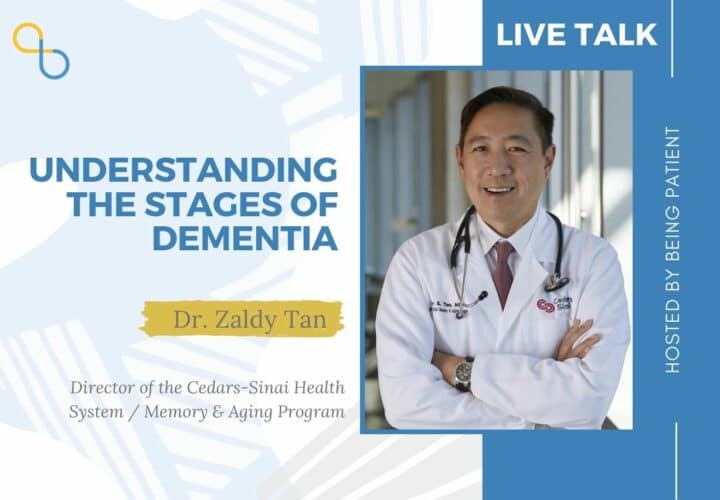As part of our LiveTalk series, Being Patient spoke with Dr. Jason Karlawish about the early diagnosis of Alzheimer’s and why it’s important for people living with the disease and their families.
It’s been more than a century since Dr. Alois Alzheimer identified the hallmarks of Alzheimer’s — amyloid plaques and tau tangles — and still, there are currently no approved treatments that can slow or halt the progression of the disease. The Alzheimer’s community is understandably frustrated, but scientific breakthroughs are often decades in the making, and there is reason for optimism.
Being Patient spoke with Dr. Jason Karlawish, co-director of the Penn Memory Center and author of “The Problem of Alzheimer’s,” about the advances in dementia research and diagnostics that have allowed for the early detection of Alzheimer’s.
Karlawish said scientists in the field of Alzheimer’s have made progress — albeit in some aspects more than others. Researchers are beginning to make headway in developing effective treatments for the disease, but the United States remains poorly equipped and unprepared to provide dementia care.
That said, Karlawish noted that scientists have made tremendous improvements in diagnosing Alzheimer’s. There are now PET scans that measure amyloid and tau in living patients, and blood tests for these biomarkers are under rapid development. Karlawish and colleagues wrote that it seems inevitable direct-to-consumer (DTC) tests for Alzheimer’s pathology would be available in the future — with potential implications that warrant serious consideration.
Being Patient: How early can you actually diagnose Alzheimer’s?
Dr. Jason Karlawish: Right now in 21st century America, I think we’re still at the point where we can diagnose the disease because you have some cognitive problems, and we can push the limits of tests that show that you have the biological markers.
What we’re not yet ready to do is to say, “You have no cognitive problems, but I am going to run these tests, and the results of those tests will tell me that you do or don’t have Alzheimer’s disease.” That would of course be a very different kind of Alzheimer’s disease. That would be an asymptomatic Alzheimer’s disease, namely no cognitive impairment. But right now the field isn’t ready to put that out into clinical practice for reasons that I think are scientifically justified.
What we are able to do is if you’ve got even mild cognitive impairment, then we push the workup to say that “you have mild cognitive impairment — not dementia — and that mild cognitive impairment is caused by Alzheimer’s disease.” We can do that now.
Being Patient: Alzheimer’s is one among many causes of mild cognitive impairment (MCI), right?
Dr. Jason Karlawish: The many diseases that cause dementia — Lewy Body disease, Alzheimer’s disease, vascular disease, TDP 43, combinations thereof — cause MCI as their initial presentation of only mild impairment that over time becomes dementia.
Dementia describes disabling cognitive impairment, so the operative word there is “disability.” Because of those cognitive impairments, you can’t do things that you used to be able to do, whereas MCI describes cognitive impairments that cause inefficiencies in daily activities. All these diseases pass through that period of time when there are inefficiencies.
Where MCI becomes more murky is it’s not just diseases that can cause MCI. Subtle but clearly noticeable impairments in cognition can be the sum of a host of insults on top of an aging brain that have nothing to do with neurodegenerative disease. A little bit of vascular disease, heart failure, lethal combinations of medications for the brain, maybe a bit of an alcohol habit, put all that together you can get MCI that’s not a neurodegenerative profile of MCI.
Moreover, I actually think that some folks with MCI are kind of on the tail-end of extreme aging in terms of the impairments that aging can cause to cognition, but I know that there are colleagues who would debate that point.
Being Patient: In an article for JAMA Neurology, you and your colleagues wrote that there would likely be at-home blood tests that detect Alzheimer’s pathology in the future, but there are many implications to consider. Can you share with us your thoughts on DTC Alzheimer’s blood tests?
Dr. Jason Karlawish: I think it’s only a matter of time before a blood test for Alzheimer’s pathology — not dementia — becomes a direct-to-consumer test. There’s a good reason why. Think of the tests that have become DTC tests. They’re tests that appeal to people who have intense desires to self-determine their life: “I want to know if I have HIV because it’s a very private personal matter. I want to know what genes I have because I value that information for myself and it’s private.” I think Alzheimer’s fits into that category of the kind of test that appeals to some people for a direct-to-consumer test.
So I would predict there will be direct-to-consumer tests for these Alzheimer’s biomarkers. I don’t like that idea, not because I don’t trust people with information, but because in America, when that consumerism spirit takes over, we tend to use these things like teenagers in a liquor store. We just don’t know when to stop drinking.
And, we don’t live in a society that is designed to support people who are disabled or at risk of disability. You can be fired. You can lose insurance. You can be stigmatized. This is not a nurturing society that fosters solidarity. The deep irony of these direct-to-consumer tests is, “I’m going to give you knowledge that empowers you in a culture in a society that doesn’t support you.” That’s pretty kind of stupid.
Being Patient: Are we going to find a cure for Alzheimer’s?
Dr. Jason Karlawish: I think planning on a cure for Alzheimer’s disease is like planning your retirement with lottery tickets. You can buy a whole bunch of lottery tickets and say, “I’m set for my retirement.” You may win big, and if you win, you will win big. But you’re not going to win the lottery.
There are other diseases that cause dementia. It’s a very heterogeneous disease in itself. And the idea that you would “cure” all those causes is I think a little too ambitious. We should anticipate a future where we can control that natural history. Some people will benefit tremendously. Some people will benefit a little bit, and some won’t.
Being Patient: What do you think about the progress of Alzheimer’s research?
Dr. Jason Karlawish: As much as everyone complains there’s no effective treatment, there’s no cure — and there won’t be a cure — I got to say you do realize that it wasn’t until 1980 that we recognized this disease. It wasn’t until about 2010 that the federal government finally kicked in enough money to really do the research … It wasn’t until 21 years ago that we were able to visualize at least part of the disease in a living human. That’s not a lot of time, granted big things can happen in one year, like the events of the last year in the world.
My point is that there has been progress, but the progress has been uneven, meaning there’s great progress in diagnostics; we’re beginning to make progress in therapeutics; there’s absolutely lousy progress in America in the quality of care and the delivery of care — I think that’s a scandal in America.
Being Patient: Why is early detection of Alzheimer’s important?
Dr. Jason Karlawish: To see the disease before there are symptoms is tightly conjoined to “I’m now going to give you an intervention that will reduce getting sicker.” Granted, some people would say, “I want to know that information so I can plan and I value knowledge,” but those are matters of personal taste. I think in a healthcare system, matters of personal taste don’t have as much priority as clear benefits to a population, regardless of your personal taste. Of course you could choose not to take the treatment.
What’s been missing and still missing in the Alzheimer’s field is a treatment that I can prescribe, like a statin drug or an antihypertensive drug, that I can say with confidence that “If you take this, you will reduce the chances of developing dementia down the road.” Someday we’ll have a treatment like that.
I believe that mild cognitive impairment diagnosis is a useful diagnosis to identify people with cognitive problems that are causing inefficiencies and put them at heightened risk of developing dementia. I’ve had a change of heart on this from earlier, but the reason I think it’s valuable is this is a disease of autonomy. I want to give people the chance to arrange how they live, to prevent the disasters of dementia, not the end-stage disasters. I’m talking about the disasters like the screwed up checkbook, the mistaken medicines, the poorly treated diabetes, the social isolation, and the failure to build trusting relationships with other people who are going to help you.
Secondly, the nature of some of the cognitive and behavioral changes that patients have oftentimes make them very suspicious and unable to take help. There’s a real value to preserve your autonomy, to actually surrender some autonomy to people early on, so that you can maintain some degree of independence. That’s a very ironic problem that this disease presents to us. We want to be independent, but I would argue to stay independent, you have to surrender some independence.
The interview has been edited for length and clarity.
Contact Nicholas Chan at nicholas@beingpatient.com




Trying to find out what to do after being diagnosed? Where do I go from here?
I have lost. All independence. I have nothing left!!
Ellen, please don’t give up hope! Reach out to your family and friends – it’s so very hard to ask for help – people truly WANT to help! My sister has Alzheimer’s (as did our mother) and the fact that my sister TRUSTS ME to help her and look out for her is a priceless gift.
Could the trial include someone who is in the late stages of Alzheimers. Example, someone in early ’70s, living in a care facility, only drinking sweet fluids, having morphine injections to stay comfortable. What harm could trialling this drug do? I’m talking about a real person – a dear friend.